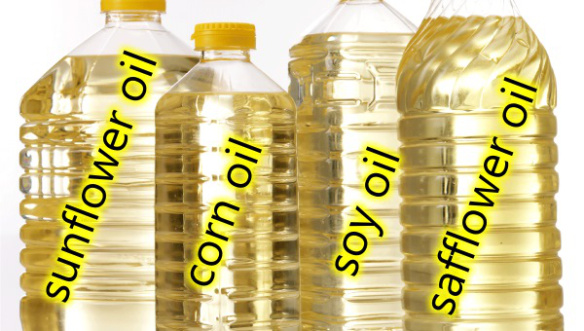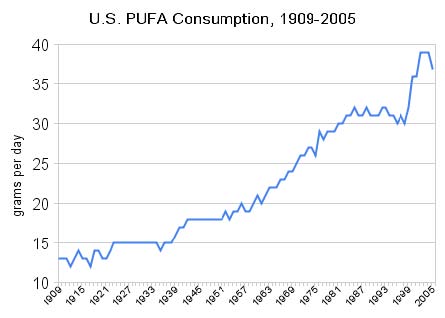Every year there’s a new study attacking red meat, even though we’ve been eating it a lot longer than people have been avoiding it. And frankly, it’s what makes us human.
The same can be said with respect to saturated fat. As historically speaking, we evolved from a diet high in animal fats – which have far more saturated and monounsaturated fats than polyunsaturated – but we’re continuously bombarded with research praising vegetable and seed oils.

Fortunately, this month provided some hope for the future. Because aside from the clear evolutionary evidence, legitimate studies are surfacing that show the long-term implications of adopting a meat-free diet, and replacing saturated fat with polyunsaturated oils.
Realistically, the evidence has always been there, as these are topics laid out in Eat Meat And Stop Jogging and Live It NOT Diet!; but what’s refreshing about this new research, is that there’s no denying it. Especially when looking at this recent study from the journal of Molecular Biology and Evolution that identifies a genetic adaptation that occurs in vegetarians and exposes them to chronic inflammation.
What’s interesting, is that this mutation (rs66698963 found in the FADS2 gene) is created to improve the synthesis of essential fatty-acids from plant-based foods. Which as we’ve discussed in the past, would otherwise be a struggle, given the extremely low or extremely non-existent conversion percentages from short-chain to long-chain polyunsaturated fats.
“With no other changes in diet, improvement of blood DHA status can be achieved with dietary supplements of preformed DHA, but not with supplementation of ALA.”
But what’s unfortunate, is that this increased ability to synthesize affects both the omega-3 pathway, and the omega-6 pathway. Meaning, vegetarians consuming large amounts of vegetable oils and foods high in omega-6’s (grains, legumes, nuts & seeds) are creating a lot of Arachidonic Acid (omega-6 EFA) compared to the DHA & EPA they could potentially get from omega-3 plant sources (algae, flax, hemp) – and sadly, often come with just as much omega-6 (1:3 or 1:4 at best).
In other words, this potential survival advantage ends up being no advantage at all. Since excessive levels of the omega-6 long-chain fatty acids (Arachidonic Acid) compared to the omega-3 long-chain fatty acids (EPA and DHA) results in a pro-inflammatory environment. The same one we see with the Standard American Diet, and the same one we see producing heart disease and cancer.

The other interesting paper worth sharing is from the British Medical Journal, where Chris Ramsden and his team uncovered unpublished (aka buried) data from the Minnesota Coronary Experiment that took place between 1968 and 1973!
The reason it was such a great finding, is because it’s one of few large-scale (9423 women and men aged 20-97), double-blind, randomized controlled studies testing the replacement of saturated animal fat with polyunsaturated fat (corn oil). Which regrettably, continues to be the standard recommendation for reducing heart disease, because it reduces cholesterol.
(something you and I both know isn’t true).
Fortunately, this study gave us the proof we needed – a reduction in cholesterol, with no ‘statistically significant’ reduction in heart disease, and an INCREASED risk of mortality. Not only reiterating the lack of association between cholesterol and heart disease, but demonstrates the health consequences of replacing the saturated animal fats we’re designed to eat with manufactured oils that have only existed for the last century (if that).

Interestingly, one could even make an argument that the heart disease risk in this study was significant, considering the autopsies showed evidence of less heart attacks in the saturated fat group compared to the polyunsaturated group.
“41% (31/73) of participants in the intervention group had at least one myocardial infarct, whereas only 22% (16/73) of participants in the control group did.”
But even if we just stick to the increased risk of death, the findings are solid – as they’re aligned with everything in the past that’s shown an increased risk of all-cause mortality, and specifically cancer, in those consuming more Linoleic Acid (LA). Especially when it’s combined with a diet lacking the disease-preventing effects of Conjugated Linoleic Acid – found exclusively in animal products (and abundantly in grass-fed varieties).
Stay Lean!
Coach Mike
RELATED ARTICLES:
Why Grass-Fed Meat Is Worth It
The Problem With Red Meat Research
Ending The Vegetarian Debate Before It Starts
Why You Should Avoid Vegetable & Seed Oils (PUFAs)
From Chronic Inflammation to Chronic Disease - 10 Ways to Prevent It
